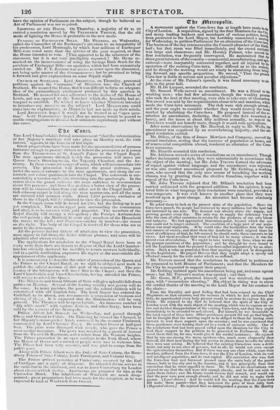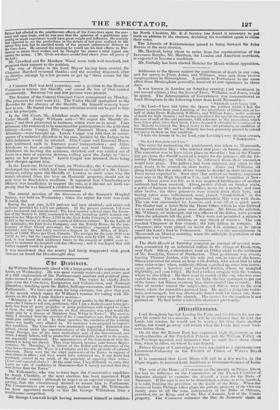Vie Aftetropolis.
A movement against the Corn-laws has at length been made in the City of London. A requisition, signed by the four Members for the Cits and many leading bankers and merchants of various politics, savg: been presented to the Lord Mayor, his Lordship summoned a meetg for Wednesday., to petition Parliament for an alteration of the Corn-I4 The business of the day commenced in the Council-chamber of the Gab hall ; but that room was filled immediately, and the crowd excludsi was large and clamorous ; and Mr. Horsley Palmer, who moved ilia first resolution, was frequently interrupted. He maintained that the three great jnterests of the country—commercial, manufacturing, and ag. cultural—were inseparably connected together, and all injured 414 operation of the existing Corn-laws. Men differed as to the remedy, and he thought the meeting would act wisely in abstaining from brims hug forward any specific proposition. He moved, " That the prose; Corn-law is liable to serious and peculiar objections."
At the close of Mr. Palmer's speech, it was foam.' necessary to am. join to the great hall.
Mr. IL De Larpent, seconded the resolution. Mr. Sanmel Wells moved an amendment. He was a friend to the working men • who had few advocates, though the wealthy person who took the lead at that meeting, were able to take care of themselves, Not award was said by the requisitionists about debt and taxation, which made the Corn-laws necessary. The rich were rich enough already; and the poor ought to consider whether they would destroy the hotne market by abolishing the Corn-laws. He proposed instead of the resolution an amendment, declaring, that while the debt remained so heavy, and the taxes at about fifty ntillions annually, to repeal tit Corn-laws would not benefit trade, though it would ruin agriculture.
After some observations by Mr. Macleod, in reply to Mr. Wells, the amendment was negatived by an overwhelming majority, and the orb ginal resolution carried. Mr. Dillon, of the firm of James Morrison and Company, moved the second resolution, stating that the increase of population at home, and of commercial competition abroad, rendered an alteration of the Cora. laws necessary. Mr. Ricardo seconded this resolution.
Mr. Atkinson moved a series of resolutions as an amendment. Though rather declamatory in style, they were substantially in accordance with the object of the meeting; but Mr. John Travers warned the advocates of repeal against violent language, and the amendment was rejected; as was also another amendment proposed by Mr. Golding, a working man, who moved that the only sure means of benefiting the working classes, was by granting them the elective franchise, together with a repeal of the Corn-laws. Mr. John Travers rejoiced that Mr. Dillon's resolution had been carried unfettered with the proposed addition. In his opinion, it mattered little in what language their resolutions were couched, provided it was temperate. It was well known in another place that they were resolved upon a great change. An alteration had become absolutely necessary— He asked them to look at the present state of the population. Since the Corn-laws passed, the people had increased by many millions, but the land had not increased by one acre. The deinand was already above the supply, aud growing greater every day. The only way to supply the deficiency was to take the corn of other countries in return for the products of our own labour and industry. We lutd approtudied Starvation-poult, beyond which the system could nut be longer endured. The condition of a large part of our population was most deplorable. If he could take the landholders into the holes and corners of society, and show them the desolation which reigned there for want of sufficiency of food, he felt assured he should make them converts to his views. Let them recollect that want of food led to many crimes ; it was the parent even of revolution. We ought to take warning in time, when we saw the present condition of the population; and he thought we were bound to tell the Legislature that the present Corn-laws called imperatively for an alteration. Such a voice as proceeded from that meeting would not be disregarded by the Legislature. Ile prayed Heaven that they might adopt a speedy and effectual remedy for the evil's under which we suffered.
Mr. Travers moved that the resolutions be embodied in petitions to be presented to both Houses of Parliament ; and that the Members for the City be requested to support their prayer. Mr. Golding insisted upon his amendment being put, and sonic uproar arose ; but Mr. Travers's motion was carried ; and then
Mr. Grote, ALP., presented himself, and was received, the report says, with "tremendous cheering." His object in rising was to move the cordial thanks of the meeting to the Lord Mayor for his conduct in the chair—
Prom the liberality and good feeling that had been evinced by the Chief Magistrate on that occasion, and the manlier in which he bud performed his duty, he apprehended every body present would be anxious to express his gra
titude. Ile rejoiced to say that lie believed that the spirit of the City of
London went with the main object of the ineeting,which was to express an en
tire end decided disapprobation of the existing Corn-laws, and that they ought innuediatel,y to be attended to and idtered. For himself; lie was favourable to the total repeal of those laws. Other gentlemen present (lid not go that length, hut he thought that the meeting ought to he obliged to them for having come forward to lend their support upon the occasion; and he was convinced that those gentlemen were lending their aid to a work of eminent utility. One of the resolutions that had been passed called upon the lembers for the City to lend their support to the petition to he presented to Parliament. Ile assured them that he, for one, would give it his cordial assistance. Ile rejoiced that he was one among the many speakers who, much more eloquently than himself, did their best during the last session to obtain those benefits for which they were now asking. Ile believed that the existing Corn-laws were a detriment, not only to one class of persons, but to all; he would not even except the agriculturists themselves. But if there was any one class which, more than another, suffered from the Corn-laws, it was the City of London, with its vast and intelligent population, and its vast capital. His conviction also was, that the Corn-law first and foremost pressed upon the main body of the poorer classes, both in the city and in the country, and it was principally from that conviction that he stood oppoied to them. Mr. Wells in his observations was pleased to say that the rich were rich enough already, and he did not wish to make them richer; now Mr. Grote would reverse that remark, and would say that the poor were poor enough already., and he did got wish to make them poorer. (Loud cheers.) And lie would tell the meeting, that the Corn-laws did make them poorer—that they increased the price of their daily food. (Repeated cheers.) Ile rejoiced that so distinguished a person as Mr. Horsley Palmer had alluded to the mischievous effects of the Corn-laws upon the currency and upon trade, and he was sure that the opinions of a gentleman possessing so much experience would have great weight and influence. lle scarcely had expected to see the predictions an the debate of last year realized to the extent they had, but he ascribed much of the present commercial distress to the Corn-laws. He assured the meeting he would use his best efforts in Par. 'lament to obtain thew wishes, and he thought the sooner a total repeal was carried the better. (11r. Grote sat down amidst loud cheers from all parts if
the hall.) Mr. Crawford and Sir Matthew Wood were both well received, and promised their support to the petition. The vote of thanks to the Lord Mayor having been carried, Sir Chapman Marshall returned thanks ; and the meeting dispersed, after an abortive attempt by a few persons to get up "three cheers for the Charter."



























 Previous page
Previous page